The coding life ain’t just about the lines you write, it’s about the folks you know.
Your network, that’s your secret weapon, the thing that fixes your career path and makes you smarter.
Without it, you’re coding in the dark, lost at sea with all those algorithms, and nobody wants that.
They say eighty percent of jobs come from knowing people.
That’s a big number, a number that should make any coder sit up and pay attention.
Imagine being the best coder, a true artist with code, but hidden away. Nobody knows your name, your skills.
It’s like writing a masterpiece and keeping it a secret, what a waste. Networking is your megaphone, it makes you louder.
It’s not just who you know, it’s who knows you and what doors open because of those connections.
Your network, it’s not just a bunch of names, it’s your team of scouts, hunting for the best jobs, the work that gets you excited, the things that can change everything. That’s the power of having the right connections.
- Jobs, jobs, jobs: Networking, that’s like having a treasure map to the jobs nobody talks about. It gets you from “applying” to “being considered” a lot faster. It’s not begging, it’s planting the seeds of opportunity.
- Mentors and growth: Your network, it’s your personal crew of mentors and experts. It’s like a masterclass in getting ahead in your career, taught by the best.
- Stay sharp: Your network is your radar, keeping you up to date on the latest tech. It makes sure you’re not stuck using the old stuff, the stuff that’s outdated.
| Benefit | Description |
|---|---|
| Job Opportunities | You get to the good jobs, the ones not on the websites. You get a referral, not just another application, that’s the way to get hired. |
| Skill Growth | You learn from the best, discover new stuff, and fix your code better. That’s what knowing the right people can do for you. |
| Industry Awareness | You know what’s hot, what’s not, and what’s coming, like your personal news feed for the tech world. Don’t be stuck behind, be ahead. |
Building this network, it’s a skill, not luck.
It needs a strategy, a plan, just like writing code.
You need to know what you want: a new job, a mentor, or maybe just someone who gets you.
It’s like planning a skyscraper, you need good plans, good materials, and a vision of how it will look like.
Your approach, it should be thoughtful, not just a pile of digital names.
You need to find the best spots to connect, craft your pitch, and make people remember you.
- Know what you want: Before you start, know your goal, it’s the compass that will guide you.
- Pick the right places: LinkedIn for your brand, GitHub for your work, Stack Overflow for advice. Don’t spread yourself too thin, focus on what works best.
- Your pitch, make it quick: Make it short, make it good. Explain who you are, what you do, and why it matters.
- Make them remember you: Be confident, be real, and be interested in others. Be memorable, for the right reasons.
Online networking ain’t just browsing, it’s about making a mark, giving value.
The online world, it’s a big place full of coders, and you need to learn how to get in the mix.
Think of it as building a city, one interaction at a time.
You can’t just show up, you have to make your presence known.
It’s about using the tools, being part of communities, and having conversations that matter.
Think of it as a fire, you have to keep it burning.
- Master LinkedIn: Make your profile pop, show what you’ve done, share what you know. Expand your connections, let people see you.
- Get on GitHub and Stack Overflow: Show your skills, fix code, answer questions, prove your worth. It’s your portfolio and your knowledge base, it’s there for everyone to see.
- Join the communities: Share your knowledge, ask your questions, and become someone people value. It’s your local café but on a global scale, get involved.
- Talk the talk: Listen more, talk less, but when you talk, make it count. That’s where real connections are made, through real and meaningful conversations.
Offline connections, they matter just as much. These are the relationships that last.
There’s something about meeting someone face to face, it beats any online chat, it opens doors you can’t imagine.
It’s like meeting your favorite writer after reading all their books.
It’s about meeting people, having real talks, and making connections that can change your career, not just collecting cards.
You need to get out there, learn the latest trends, meet other developers, and make those online contacts into real relationships.
- Conferences and meetups: That’s your hunting ground. Find new jobs, learn from others, and make the connections you need.
- Local Events: Meet the people around you and grow your local network, like your neighborhood team of experts.
- Start talking: Be open, be real, and be interested. Like talking to a new neighbor, take the first step, be yourself, and have a real conversation.
- Follow up: Keep the connection going with personalized notes, keep the interaction alive, like saying thanks after a good dinner.
Building your network, it’s not a one-time thing. It’s like a garden, it needs care to keep growing.
It’s more than just collecting names, it’s about building strong connections. It needs work, it needs attention.
You should try to help others grow, not just think about what they can do for you, because it’s a two-way street, where both sides should win.
- Stay in touch: Talk to your network, let them know what’s up, so you’re the first person that they think of.
- Give value: Share good stuff, give help, and offer support.
- Ask for help: If you need something, be specific, and be ready to return the favor.
- Real connections: Make connections with respect, trust, and kindness, they will grow stronger, like a good friendship.
Networking, it has its own rules. It’s about respect and good behavior.
If you don’t follow them, your network will fall apart, like a code that doesn’t follow the rules. Respecting other people’s time, that’s important.
Don’t overload them with your stuff, listen more than you talk, and keep it professional.
- Time is precious: Be clear, be short, don’t waste anyone’s time. Value the time that people are offering you.
- Don’t brag too much: Focus on others, your expertise will come through your actions. Be a listener, not just a speaker.
- Listen up: Truly understand others, show respect, give them your full attention, and be there for them.
- Stay classy: Be nice, be good, and have good interactions. Be someone that people want to be around.
Networking, it needs the right tools, the things that make your life easier.
From platforms to apps, they will help you find people and network faster. Think of them like your tools in your toolbox.
The more tools you have, the better you will be, and these tools will make you more effective and efficient.
- LinkedIn Sales Navigator: Use it to find the right people and connect with them, it’s like your search engine for professionals.
- Eventbrite: Find events, meetups, and conferences. Keep your schedule in one spot, and be ready to go.
- Meetup.com: Find local groups and meet people with shared passions, there is no better way to build your local network.
- Slack communities: Talk to other professionals, grow your global network, think of it like an online office where everyone works together.
Networking, it’s not a straight line, it’s a dance between building, caring for, and improving your connections.
If you start now, you will get plenty of rewards, and your network will be one of your most valuable assets, so start building it today.
Why Networking Matters for Developers
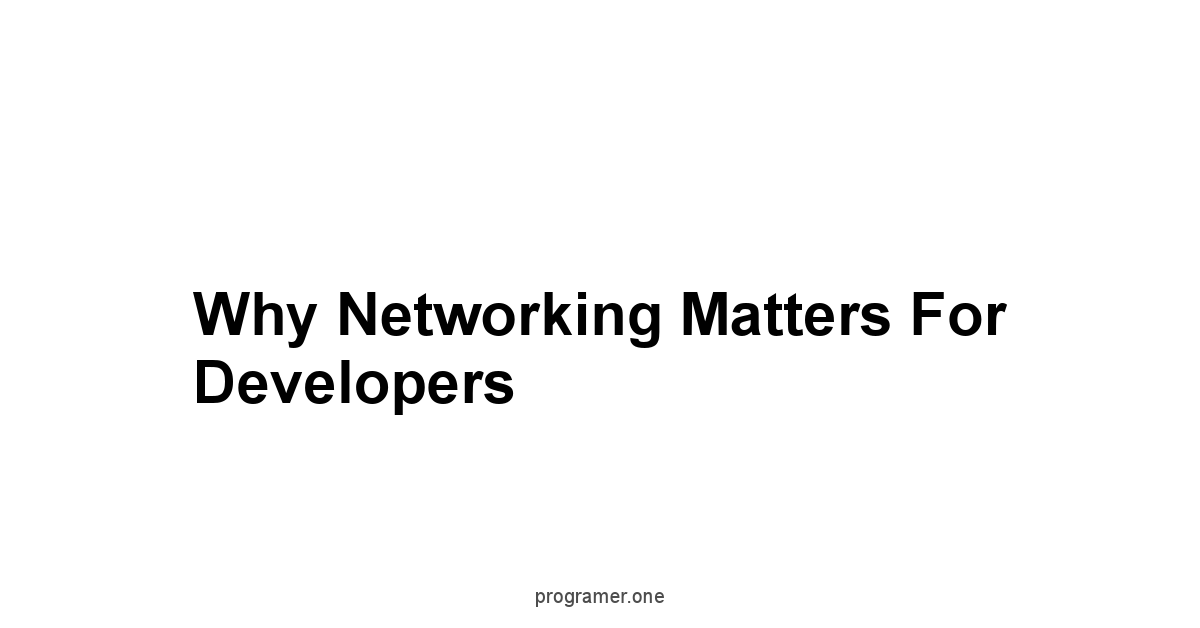
Networking, it’s not just about collecting names, it’s about building a community around you, a support system, a launchpad.
For developers, it’s the hidden code that unlocks career doors, fuels growth, and keeps you sharp.
It’s like having a well-structured database of connections that can help you debug your career path or discover that new, cutting edge technology you’ve been looking for.
Ignoring this is like writing code without comments, eventually, you’ll find yourself lost and struggling to understand where you went wrong.
You’re a craftsman, and your network is your workshop, it’s where you find the best tools, learn the latest techniques, and share your skills, without it, you’re just hammering away in the dark.
Think about it.
You could be the most brilliant coder in the world, a true artisan with algorithms, but if you’re sitting alone in your room, how many people will ever know it? Networking isn’t about who you know, it’s about who knows you, and what you know, and the opportunities that can bloom from those intersections.
Your network is like having a team of scouts, always out there, discovering potential jobs, projects, and collaborations that you might never stumble upon yourself.
It’s a multiplier of opportunity, and the stronger it is, the further you can go.
It also means that in this ever-changing world of tech, you’re not stuck in your bubble, but rather, tapped into what’s happening, and that gives you the edge.
Opening Doors to Opportunities
Networking is your key to unlocking career doors you didn’t even know existed.
It’s not about begging for a job, it’s about planting seeds, creating connections, and letting opportunities find you.
You could be looking at a job market, where hundreds of applications disappear into a void, or you can have a conversation with someone who knows exactly what you’re looking for, and they know the people who can make it happen.
In my experience, jobs often come through the back door, someone knows you’re good, they recommend you, and bam, you’re in.
It’s the old ‘who you know’ but with a modern, collaborative twist.
It’s a truth that’s as solid as the foundation of a bridge, networking widens your search and shortens your time, it’s how you go from ‘applying’ to ‘being considered.’ Look at it like this: a job posting is one voice shouting into a crowd, a referral is a trusted recommendation whispered directly into the ear of the person who makes the decision. It’s a faster, more efficient path.
Moreover, these opportunities are not always about new jobs, it could be a collaboration with a fellow developer on a side project, or a mentorship opportunity, or even a chance to learn a new skill set from someone in the field, all of these things contribute to your long term growth.
Growing Your Career and Skills
Your network isn’t just a source of job leads, it’s your personal advisory board, a team of mentors, collaborators, and experts you can learn from, a masterclass in career advancement.
Connecting with people in different roles and industries is like reading a textbook from different authors, each offering unique perspectives and different techniques.
The ability to learn from others’ experience, their successes, and their failures, it’s something you can’t get from online tutorials or books.
It’s like learning the secret ingredients to their success.
A strong network also pushes you to grow in ways that you might not have considered on your own.
You might hear about new languages, tools, and frameworks that are becoming the standard in the industry, and it can push you to explore them.
Here is an idea, a senior developer you connect with might give you pointers on how to get better at problem-solving, or perhaps they will share some tips on how to manage time or even negotiate your salary.
When you surround yourself with sharp minds, you’ll get sharper too.
Think of your network like a growth accelerator, it’s not passive, it’s a dynamic force that pushes you toward improvement and new horizons.
Staying Ahead of the Tech Curve
The tech world moves fast, faster than a greased lightning, and if you’re not tuned in, you’ll be left behind, like a forgotten program.
Networking is your radar, it’s your early warning system that lets you know about the latest trends, new tech, and the emerging best practices in the industry.
You’re not just hearing about these things, you’re talking to the people who are actually building them.
This keeps you on the cutting edge, not just a bystander.
You don’t want to be stuck on an obsolete technology, and your network helps you avoid this.
It’s like having a front-row seat to the future.
Your network keeps you updated on the current trends, and what might be next, it’s a stream of valuable information, fresh and relevant.
Here is something for you, developers at conferences are not just talking about what they’re doing right now, they’re talking about what’s coming next, the next big trend, or a new solution to a common problem.
That’s what you need to know, and that’s the kind of information you pick up with a good network.
If you’re serious about building a successful career in tech, you need to be actively connected, it’s the only way to stay in the game.
Building Your Network: The Essentials
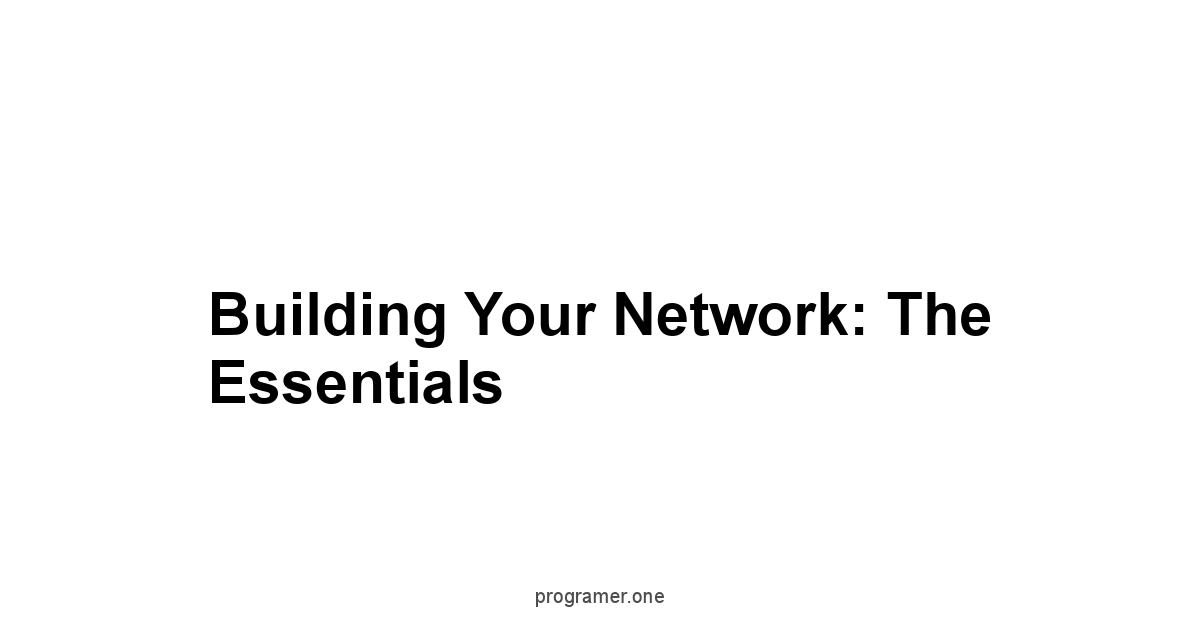
Building a network isn’t about randomly collecting business cards or sending generic connection requests.
It’s a strategic process, like planning a complex piece of software, you need a clear roadmap, a defined set of objectives, and an understanding of your tools.
The first step is to know what you want, what are your goals, then you can start choosing the right places to make connections, and finally, you should be able to introduce yourself concisely and leave a lasting impression.
Without planning, it’s just a chaotic mess of noise and missed opportunities, and in that mess, you’ll get nowhere.
Networking isn’t about being artificial, it’s about building real connections, real relationships based on respect and mutual value, and that starts with clarity and preparation.
It means understanding your own needs, then identifying the platforms and environments where you can meet people who can help you with those needs.
It also means making a good first impression, which sometimes is all it takes.
It’s like building a solid foundation for a building, you start with good plans, the best materials, and by following your architectural vision, the final structure is solid and enduring.
Identifying Your Networking Goals
Before you start your networking journey, take a moment to consider what you’re aiming for.
Are you looking for a new job, mentorship opportunities, or perhaps to find collaborators for a side project? Without a clear goal, you’ll be just wandering around aimlessly, wasting time, and missing opportunities.
Like writing software, you need to define your requirements before starting to code.
It’s about knowing what you’re looking for so you can recognize it when you see it.
Knowing your goals helps you focus your efforts.
If you are looking for a job in a specific field, for instance, that will guide you toward specific events and professional groups.
If you’re looking for mentorship, then the right people to connect with might be more experienced developers.
Having defined goals helps you measure your progress and adjust your approach accordingly. This clarity is important for effective networking.
Here is an example, if your goal is to find work in AI development, you could focus your efforts on LinkedIn groups, online forums, and meetups that are specific to AI. That way, you are maximizing your efforts.
Choosing the Right Platforms
Just like you wouldn’t use a hammer to tighten a screw, you shouldn’t use every social media platform for networking.
You have to choose the right tools to get the job done.
LinkedIn, GitHub, and Stack Overflow each offer different networking potential, and understanding how to use them effectively is crucial.
Choose your platforms based on your goals and the type of connections you want to make.
Don’t spread yourself too thin, focus on the platforms that will give you the most impact.
LinkedIn is the perfect place to build your professional brand, it’s where you can connect with potential employers and showcase your skills.
GitHub is great for showcasing your work through your projects, and it’s the best place to connect with other developers who share your interests.
Stack Overflow is a gold mine for expert advice, and it’s also a great place to find people with deep technical knowledge in specific areas.
Think of it like a construction site, LinkedIn is the administrative office, GitHub is where the blueprints are shared, and Stack Overflow is where the experts go to solve tough problems.
Pick the platforms that resonate with you and your goals, and then use them to their full potential.
Crafting Your Elevator Pitch
An elevator pitch isn’t a sales pitch, it’s a concise and compelling introduction that conveys who you are, what you do, and what you’re passionate about.
Think of it like the README file for your professional self.
It should be brief, memorable, and leave people wanting to know more about you.
You only have a few seconds to make an impression, so you need to make them count.
A good elevator pitch is like a well-written headline, it should capture the attention of the audience and make them want to read more.
Your elevator pitch should highlight your unique skills and experience and what you bring to the table.
It’s not just about saying what you do, it’s about explaining the impact of your work.
It’s more effective to say, ‘I build scalable systems that handle millions of transactions’ rather than saying, ‘I’m a backend developer.’ This gives your audience a better understanding of your expertise, and encourages them to learn more.
Remember, it’s about being specific, impactful, and it should resonate with the person you are speaking with, and it should make it clear what you’re about.
First Impressions Matter
A first impression is like the cover of a book, it determines whether someone will pick it up and read it.
In networking, you only have a few moments to make a positive impression, so it’s important to present yourself professionally.
Your first interaction with someone can either open doors to new opportunities, or it can close them instantly, and that is not something you can take lightly.
It’s crucial that you make sure you are perceived as someone that people would want to know.
It’s more than just making sure that your clothes are appropriate, it’s also about your attitude and how you communicate.
You need to be confident, enthusiastic, and genuine.
A strong handshake, a smile, and maintaining eye contact are small things that can have a big impact on how you are perceived.
Most importantly, you should be an active listener, show interest in what other people have to say, and be ready to ask engaging questions.
It’s not just about talking about yourself, it’s about being interested in the person in front of you. You should be memorable, but in a positive way.
Online Networking Strategies
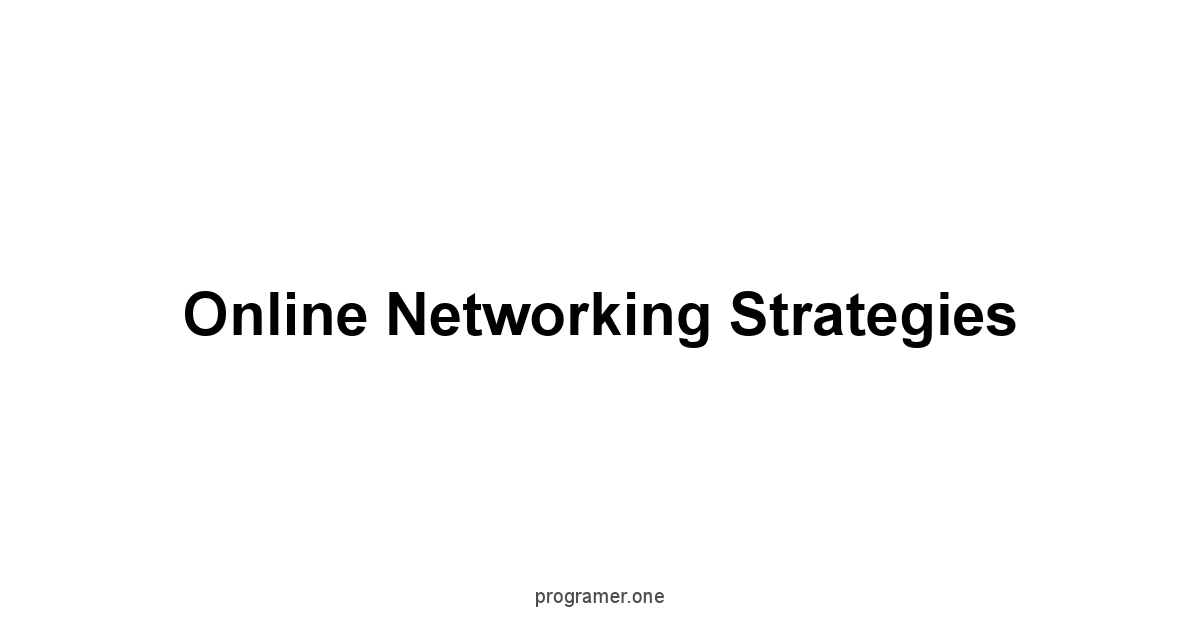
Online networking isn’t just about passively browsing social media, it’s an active pursuit that requires a strategic approach.
It’s about using the right tools, engaging in the right communities, and making meaningful interactions.
If you approach it like a chat room, you’ll get nowhere.
You need to approach it like you’re building a city online, each interaction is a building block of your network.
The key is to participate, contribute, and create value for others in the community.
Your focus should be on being intentional, providing value, and building real connections.
This includes mastering platforms like LinkedIn, engaging actively on GitHub, and being an active participant in online communities.
It’s not just about showing up, it’s about making your presence felt in a way that adds to the conversation.
You should be genuine and proactive, and you’ll find that your network expands exponentially.
Mastering LinkedIn for Developers
LinkedIn is the professional networking hub, like a global conference hall, but it needs to be used the right way.
For developers, it’s more than just an online resume, it’s a platform to showcase your skills, connect with peers, and explore job opportunities.
The key is not just to create a profile, it’s to optimize it so you stand out, and then engage with other professionals on the platform.
You want to appear to be at the top of your game, someone with substance, skills, and knowledge to share.
Your profile should be detailed, emphasizing specific projects, technologies, and your accomplishments.
Don’t just list your jobs, describe your achievements and quantify them wherever possible.
Join groups relevant to your interests, participate in discussions, and share valuable content to position yourself as a thought leader in your field.
You should also connect with people you’ve met, from conferences to online interactions, the more you connect with people, the more you’ll expand your network.
You have to use LinkedIn like it was designed, to be the most powerful tool for professional connections.
Engaging on GitHub and Stack Overflow
GitHub and Stack Overflow are more than just coding platforms, they’re places where developers show their skills, contribute to the community, and form connections with other professionals in the field.
GitHub is where you can share your code, collaborate on open-source projects, and show your work, It’s your portfolio that is open to the world.
Stack Overflow is a place to ask questions, and provide expert answers, and demonstrate your skills in a public forum.
Both these places are great for making a positive impression on other developers, and building your reputation as someone knowledgeable, competent, and helpful.
On GitHub, you need to contribute meaningful code, not just copy and paste existing work.
Engage in code reviews, offer constructive feedback, and participate in discussions.
On Stack Overflow, answer questions thoughtfully and accurately.
It’s not just about getting points, it’s about helping others and showing your expertise in the process.
These platforms are like a live coding session that can be seen by the whole community.
If you contribute positively, you’ll build a strong reputation, and you’ll connect with like-minded developers.
Leveraging Developer Communities and Forums
Online developer communities and forums are gold mines for connecting with others in your field, think of them like local cafes, but with global reach.
They provide a place for you to share knowledge, discuss issues, and learn new things.
Whether it’s Reddit’s developer subreddits, Discord servers, or dedicated forums, these platforms can help you expand your network and access expert knowledge.
These communities are filled with developers, ranging from new to experts, with whom you can share experiences and build relationships.
To make the best of these communities, be an active participant.
Don’t just lurk in the shadows, contribute to the discussions, ask questions, and share your insights.
Be respectful, helpful, and genuine in your interactions.
You want people to remember you as someone who adds value to the community, not someone who is just using the community to get personal gain.
These online spaces should be a safe and nurturing environment where you can grow, learn and connect with others who share your passions, and you should be part of that positive exchange.

The Art of Online Conversation
Online networking is not about sending generic connection requests, it’s about engaging in meaningful conversations.
It’s just like in-person conversations, except that you’re using a keyboard, so you need to craft every word carefully.
This also means you can’t just barge in and start promoting yourself, you need to be polite, thoughtful, and show real interest in the person you’re talking to.
If you’re engaging in a genuine conversation online, you’re more likely to build a strong connection.
The key to online conversations is to listen more than you talk, even if it’s just online.
Read what others have posted, understand their perspectives, and then respond thoughtfully.
Don’t use generic comments, try to add value to the conversation and offer your unique perspective.
It’s the equivalent of engaging in a proper discussion, and not just interrupting to hear yourself talk.
The goal is to build real relationships, and that is only possible through real, meaningful interactions.
Offline Networking Strategies
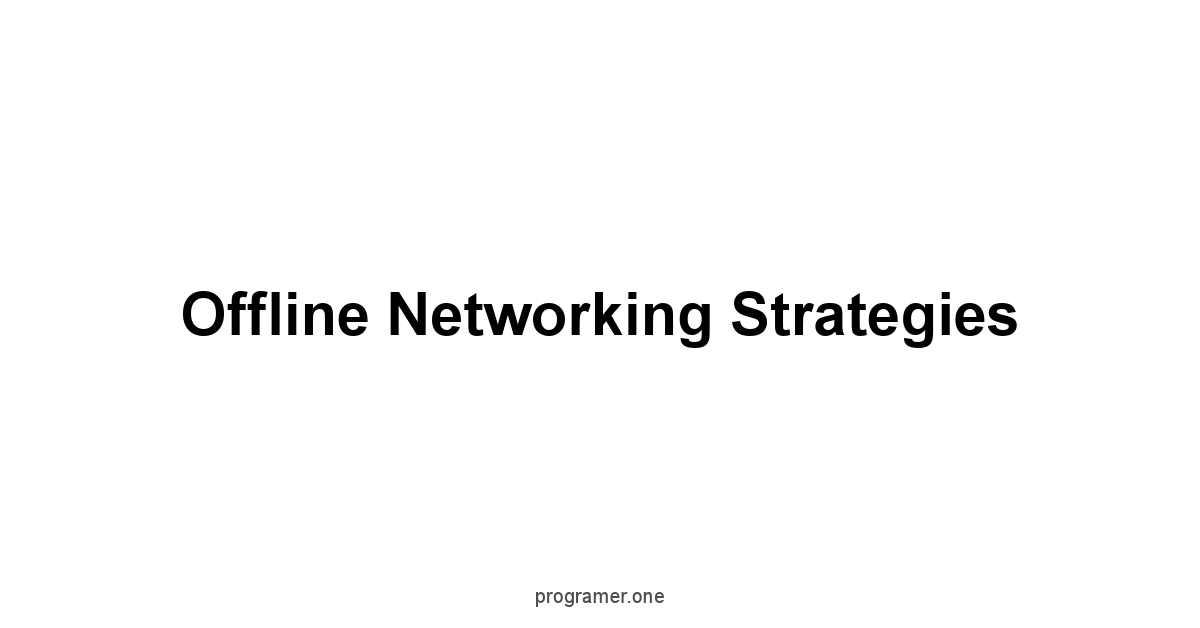
While online networking is great, offline interactions are the foundation of real, long-lasting relationships.
There is something about meeting people face to face that strengthens the connections in ways that online interactions just can’t match.
Think of it like meeting your favorite band after a concert, it’s more memorable than just listening to their podcast.
It’s in those interactions that you can make real, personal connections, that open doors to countless possibilities.
It’s about seeing people, having real conversations, and creating those memorable interactions.
Offline networking is about taking the digital connection to the real world, and making it personal and tangible.
This involves going to conferences and meetups, engaging in face-to-face interactions, and following up with those new contacts.
It’s in these spaces where you can learn about the latest trends, meet other developers, and build meaningful relationships.
It’s not about collecting business cards, it’s about creating real interactions that will form solid connections.
Conferences and Meetups: Your Hunting Grounds
Conferences and meetups are prime locations for developers to network, learn, and engage with their peers.
Think of them as your personal hunting grounds, where you go to find opportunities, learn new skills, and connect with other professionals.
They bring together people with shared interests, and they provide an environment where you can have meaningful conversations, and it provides the perfect space for building real relationships.
This is where you can meet your future mentors, collaborators, or even your next employer.
To make the best of these events, don’t just attend, participate, and don’t just be a passive observer.
Go to the sessions, ask questions, and talk with the speakers.
Visit the exhibit booths, engage with the people there, and collect some information.
Network with other attendees during breaks, introduce yourself, and get to know other people.
These events are more than just a place to listen to talks, they’re a vibrant community where you can learn, grow, and form valuable connections, that are crucial to your development.
Making the Most of Local Events
Local events, such as meetups and workshops, are great for building your network within your local community.
They’re like neighborhood gatherings, where you can meet people who live near you, and share your interests and passions.
These events are more personal and give you the opportunity to form stronger bonds.
It gives you a sense of community, and a chance to grow together with others in your own backyard.
They’re like your local team of experts, you can help each other succeed.
To get the most out of these local events, go there with a plan.
Introduce yourself to people, and be an active participant in the conversations. Don’t just attend the event, be the event.
Offer your insights, share your experiences, and be ready to learn from others.
By investing in your local community, you’re building a support system that will help your growth.
This means you will have direct connections that can help in real time, this can be a very powerful tool for your growth.
Striking Up Conversations in Person
Striking up conversations in person can seem like a challenge, but it’s really just about being approachable and showing genuine interest in others.
Think of it as starting a conversation with a neighbor, be casual, friendly, and interested in what they have to say.
The key is to be yourself, confident, and open to new interactions.
Remember, people are as nervous as you are, so the best way to connect with someone is to simply take the first step.
To start a conversation, you need to have a few icebreaker questions, like ‘What did you think of the last talk?’ or ‘What projects are you working on?’ These simple questions open the door to more meaningful conversations.
After you introduce yourself, listen more than you talk.
Show genuine curiosity, and ask follow up questions.
If the conversation goes well, you should always ask them how to keep in touch, you could even exchange contact details.
Remember, it’s not about quantity, it’s about quality interactions.
Following Up After the Event
Following up after a networking event is as important as the event itself.
It’s like writing a thank you note after a great dinner party.
You want to keep the connections you made, and cultivate the relationships that you started.
It’s the part where you solidify your connections, and turn them into more meaningful ones.
Don’t let those connections fade into the background, be proactive and keep in touch.
Send a follow-up message, personalize it, and mention something specific that you talked about.
This helps them remember you, and shows that you were paying attention.
You can also invite them to connect on LinkedIn, and perhaps start a conversation about topics they are interested in.
Keep the interactions going, offer help, share valuable resources, and continue to build on the relationship.
It’s not enough to meet someone once, you need to keep the connection alive for it to become something more meaningful, otherwise it will be just another missed opportunity.
Nurturing Your Network
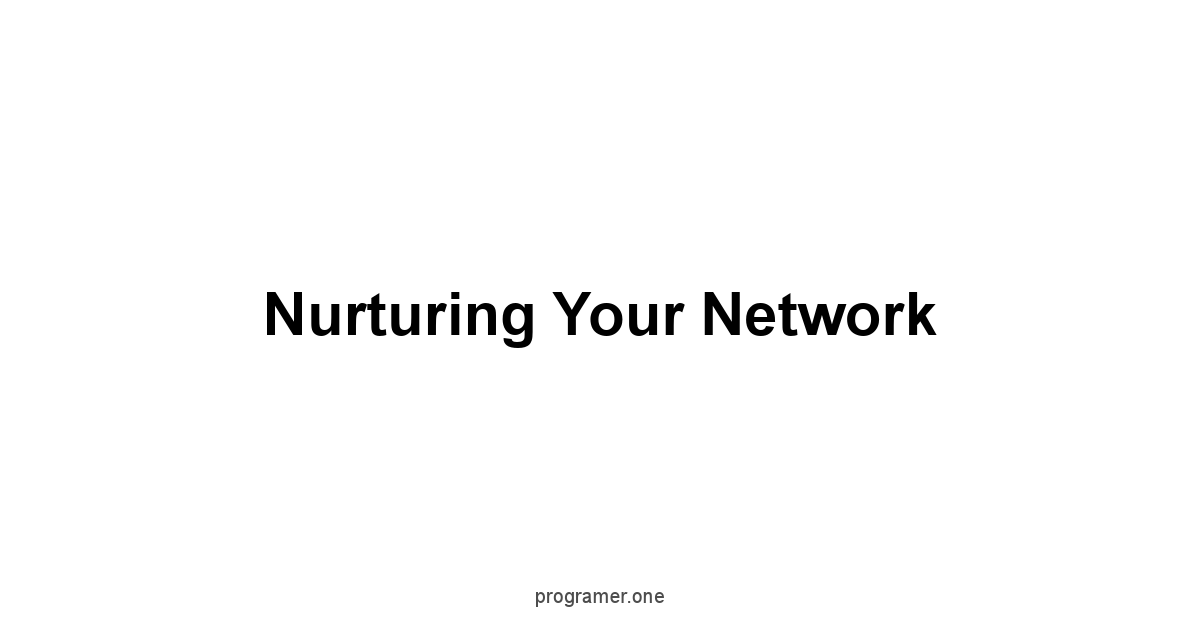
Building a network is just the first step, nurturing it is the real challenge.
It’s not like planting a tree and walking away, you need to nurture it, give it attention, and care for it for it to grow.
Your network is like a garden, it needs consistent tending, otherwise it’s going to wither away, and become useless.
The goal here is to create meaningful and real relationships, and not just collecting names.
Nurturing your network is not just about what you can get from people, it’s about how you can help them succeed.
You need to be there for your contacts, and provide them with value whenever you can.
This means you need to be in constant contact with them, offer help and advice, and ask for their support when needed.
It’s a two-way street, both sides should be giving and receiving.
The strongest networks are built on trust, support, and mutual respect.
The Importance of Consistent Contact
Consistency is the key to keeping your network active and engaged.
Just like you wouldn’t neglect a plant after watering it once, you can’t just connect with people once and then forget about them.
The goal is to have an active and engaging relationship.
Think of it as keeping in touch with your friends, you need to make the effort to call, text, or email them.
It’s about maintaining a presence in their lives and nurturing those connections.
Regular contact keeps you top-of-mind for opportunities.
If you are constantly engaging with your network, people are more likely to think of you when they come across a job, a project, or a need that is within your skills.
You don’t have to engage in long conversations, just a simple ‘how’s it going’ or sharing a useful article keeps the connection alive.
Consistency is about staying connected, sharing resources, and being a constant presence in the lives of your connections.
Offering Value to Your Connections
Networking isn’t just about what people can do for you, it’s about what you can do for them.
Think of it as adding value to the community, and making your network stronger.
By offering value to your contacts, you’re building goodwill, and strengthening your relationships.
When you are generous with your knowledge, time, and resources, you become a valued member of your network, someone that others want to help and collaborate with.
You can offer value in many ways: sharing useful articles, recommending them for opportunities, offering advice, or even connecting them with other people in your network.
When you focus on providing value, people will want to help you back, and you’ll find that your network becomes a strong support system.
It’s about being a giver, not just a taker, and creating a network that is beneficial for everyone involved.
It’s about building trust, and making sure that everyone in the network benefits from it.
Asking for Help, the Right Way
Asking for help is a sign of strength, not weakness.
It means you know what you don’t know, and you are willing to seek guidance from others.
However, asking for help in the wrong way can damage your network.
It’s just like using the wrong tools, you could damage things if you’re not careful.
The key is to ask for help strategically, and with respect for people’s time and resources.
When you need help, be specific about what you need.
Don’t just say ‘I need a job’, explain your specific skills and what kind of role you’re looking for.
Show that you have put in the work and are not just looking for a handout.
When someone helps you, show your appreciation, and be ready to help them in return.
Remember, it’s about building a two-way relationship, and both sides must be willing to help each other out when needed.
Building Genuine Relationships
Genuine relationships are the backbone of any solid network.
It’s not about accumulating contacts, it’s about building long-lasting connections, based on trust, respect, and genuine interest.
Think about it like building a friendship, you care about the person, not just what they can do for you.
A network built on solid, genuine relationships is more resilient, supportive, and beneficial in the long term.
It’s about connecting with people on a human level.
To build genuine relationships, focus on being a good listener, be interested in what others have to say, and be supportive of their goals.
Show up to events and try to help in any way you can, and be genuine, authentic, and respectful. Don’t make every interaction about your own needs.
You want people to see you as more than a professional contact, but also as a genuine human being that they enjoy interacting with.
These are the connections that will provide real support and opportunities in the long run.
Networking Etiquette for Developers
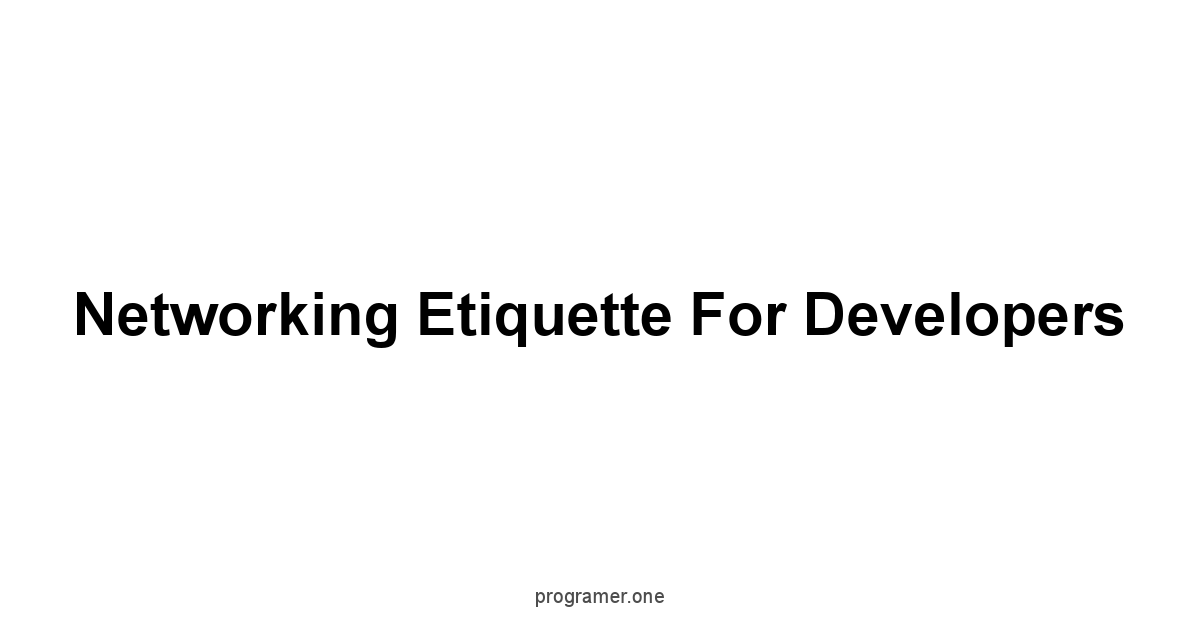
Networking isn’t a free for all, it requires a code of conduct, just like the code we write, if you don’t follow the rules, everything falls apart.
It’s about being respectful of other people’s time, avoiding being overly self-promotional, and being a good listener.
If you break these rules, you could damage your relationships and your reputation, and that is hard to recover from.
Think of it like building trust with other people, if you break that trust, it’s hard to fix, or come back from.
Good networking etiquette is about showing respect, being professional, and creating positive interactions.
It’s not just about what you say, it’s about how you say it, and how you behave.
You should also be respectful of other people’s boundaries and avoid being overly aggressive or pushy.
Your goal is to build lasting relationships, and this is only possible when you are respectful of other people, and show them the same consideration that you would expect from them.
Being Respectful of People’s Time
Time is a valuable commodity, you should not waste it, especially when it comes to other people.
Being respectful of people’s time is one of the most important aspects of networking etiquette.
It’s about making sure that every interaction is productive and respectful of their time.
You need to value and respect the time that people give you, and make sure that you’re not wasting it.
It’s about being efficient, clear, and concise in your communication, and not wasting other people’s time.
Before asking for help or advice, think if the information that you are looking for is readily available, and if you can’t find it, then when you do reach out, be clear and concise about what you need.
Avoid long stories or rambling conversations, always get to the point.
When you’re at a conference or a meetup, don’t monopolize people’s time. Be mindful of others who want to engage with them.
Respect for people’s time shows that you are a professional, and someone that they would want to help in return.
Avoiding Self-Promotion Overload
Self-promotion has its place, but it shouldn’t dominate every conversation.
If you are always talking about yourself and your accomplishments, it becomes tiresome, and can push people away.
Networking is about building relationships, and not just about making people listen to you talk about yourself.
It’s about being humble, authentic, and showing genuine interest in other people. The idea is not to make it all about you.
When engaging in a conversation, focus on learning more about others.
Ask about their experiences, their passions, and their goals.
Be sure to keep your self-promotion subtle, and share your experience only when it’s relevant to the conversation.
It’s more effective to show your expertise through your actions, and by offering value, rather than just talking about it.
Don’t treat networking as your personal marketing tool, instead, treat it as a place to make meaningful and genuine connections.
The Art of Active Listening
Active listening is not just hearing what someone is saying, it’s about truly understanding their perspective.
It’s about giving people your full attention, and paying attention to both what they are saying and what they are not saying. You should be in the moment, present, and engaged.
This shows respect, empathy, and makes the person you are talking to feel valued.
It’s the most important skill to have in networking.
To be an active listener, you should be making eye contact, nodding your head to acknowledge the speaker, and avoiding interrupting them.
Ask clarifying questions, and summarize their points to make sure that you understand them properly.
Don’t just wait for your turn to speak, focus on what’s being said and how it’s being said.
Active listening is not a passive activity, it’s a skill that can help you build stronger connections.
Maintaining Professionalism
Professionalism should be the cornerstone of your networking interactions.
This is not about being cold and distant, it’s about being respectful, courteous, and acting in a way that reflects positively on yourself and your network.
You are representing yourself, your skills, and your professionalism to your network, and that should be taken seriously.
Think of it like the way that you dress, you have to dress in a professional way, and that’s just the way it is.
Professionalism means using appropriate language, being punctual, and responding to messages in a timely manner.
It also means avoiding gossip, and keeping the conversations constructive and appropriate for a professional environment.
It’s about keeping your personal life separate from your professional one.
This means that you should be aware of your online activity and how it reflects on your professional image.
Always remember that you are part of a larger community, and you should always represent it with professionalism and respect.
Tools and Resources for Networking
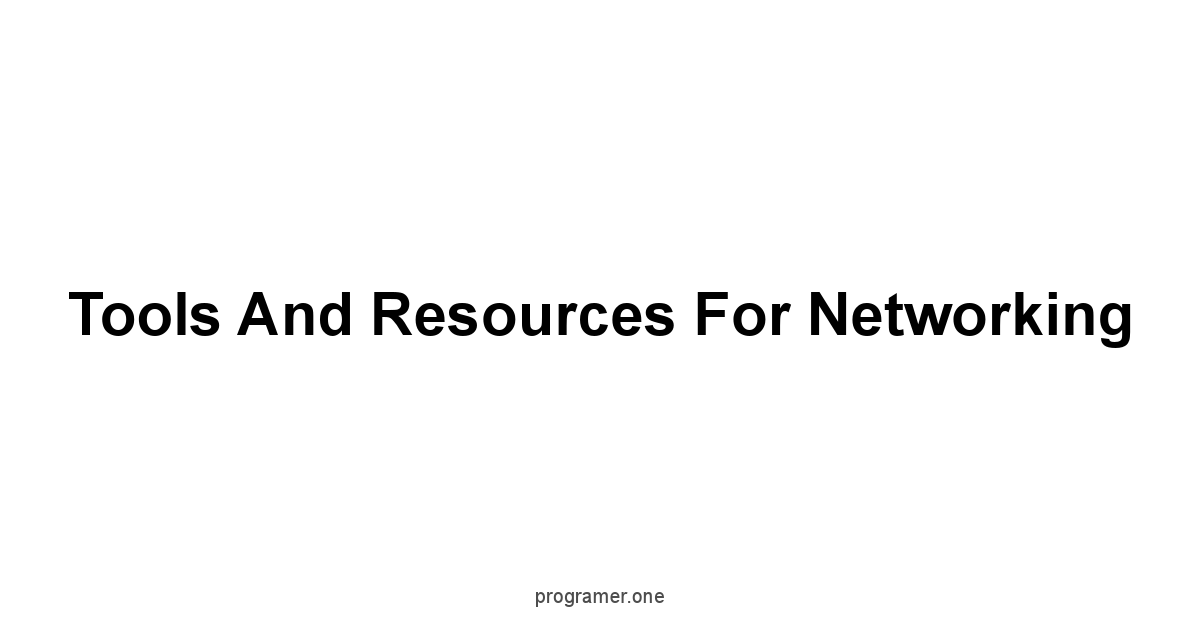
Networking isn’t just about personal skills and etiquette, it’s also about utilizing the right tools and resources to make your efforts more effective and efficient.
There are many platforms and applications that can help you find events, manage your contacts, and stay in touch with your network.
Think of these as tools for your networking toolkit, like hammers, screwdrivers, or wrenches, and the better your toolkit is, the better your work will be.
The key here is to understand how to use them effectively.
These tools and resources can help you organize your contacts, discover new networking opportunities, and manage your schedule.
They can also help you stay in contact with people, share your ideas, and keep the connections that you worked so hard to build.
The right tools are going to save you time and make you more efficient, so you can focus on what matters the most, creating real human connections.
Leveraging LinkedIn Sales Navigator
LinkedIn Sales Navigator is a powerful tool for serious networkers, like having a GPS for your professional networking journey.
It offers advanced search capabilities, the ability to track leads, and the ability to connect with people you would not have access to with a normal LinkedIn account.
It’s not a free tool, but if you’re serious about expanding your network, it’s definitely worth considering.
It’s like having a private investigator, they can find the connections that you need.
The advanced search filters help you find people with the specific skills, titles, and interests that you’re looking for.
You can create targeted lists, and save them for future reference, and you can keep track of everyone you connect with.
It provides you with the insights to make better connections, and to focus your energy on the people who matter the most to you.
LinkedIn Sales Navigator is like having a professional assistant that can help you find the right people, and help you build your professional network more efficiently.
Using Eventbrite for Meetups
Eventbrite is a gold mine for finding events, including meetups, workshops, and conferences.
It’s like a massive event calendar, with everything organized in categories and dates, so you can find exactly what you’re looking for.
With Eventbrite you can discover local and online events that match your interests and networking goals, you can even purchase tickets and manage your schedule all in one place.
Eventbrite helps you find events by category, date, and location, and it also provides you with detailed information about each event, such as the speakers, the agenda, and the location.
You can also use the platform to connect with other attendees before the event, and make new friends before you even arrive.
It is a powerful tool that helps you manage your networking activities, and makes sure that you’re always up to date with what’s going on around you, and that is something that you can’t take lightly.
Exploring Meetup.com
Meetup.com is a platform dedicated to helping people find local groups and events, and it’s especially useful for developers.
It’s like a local community center, but online, filled with groups for all kinds of activities and interests.
It’s where you can find groups focused on specific programming languages, frameworks, and tech topics, that are happening in your local area.
It’s perfect for connecting with other people in your industry, and build relationships.
Meetup.com allows you to search for groups based on your location and interests, it also lets you join groups, receive notifications about upcoming meetings, and interact with other members of the group.
It provides an excellent opportunity to meet people face to face, and build real connections in your community.
Meetup is all about building local communities, and that is something that you should always take advantage of, it will grow your professional network.
Utilizing Slack Communities
Slack is not just for internal team communication, it’s also a powerful tool for networking.
Many developer communities, open-source projects, and tech groups have active Slack channels.
These communities provide a place for you to connect with other professionals, share information, and learn new skills.
Slack is like an online office, where everyone is working together in the same space.
Slack communities are real-time communication platforms where you can engage in conversations, ask questions, and share your thoughts with other professionals.
You can also use Slack to find and connect with mentors, and learn from experts in your field.
The ability to network with people from all around the world is a very valuable opportunity that you should always consider.
The key is to find communities that align with your goals and actively participate in them.
Conclusion
It is not enough to be a skilled coder, you need to have connections, because without it, your skills are like a magnificent tree in the middle of the forest, beautiful but unseen.
This is not about collecting names or random interactions, but about creating real connections with other developers, and in that community, you will find the support, the advice, and the opportunities you need to reach your full potential.
Your network is the bridge between where you are now and where you aspire to be, and you can’t get to the other side if there is no bridge.
Whether it’s LinkedIn, GitHub, online forums, or local meetups, the opportunities to connect are endless.
According to a recent study by LinkedIn, professionals with strong networks are 26% more likely to be promoted or receive new job opportunities, it also shows that 70% of jobs are not advertised publicly, meaning that your network is your best way of finding those opportunities.
So it’s not enough to just code in your room, you have to go out, interact with people, and share your knowledge, this is how you will get known, and that is your key to success.
This is your chance to go out, connect with the community, and get the support you need.
But networking is not just about expanding your reach, it’s about building genuine relationships, and in that, there is real power.
By engaging in meaningful conversations, offering value, and showing respect for the people you connect with, you build a strong support system that will last you for your career.
Always keep in mind that your network is not just a resource, it’s a community of fellow professionals who are here to support each other.
When you approach networking with the intention of giving, not just taking, you’re going to find that opportunities start finding you, that’s the beauty of it.
Nurture your network, like you would a garden, and it will provide you with the fruits that you want.
So, remember, it’s not just about what you know, it’s about who you know and who knows you, and how you interact with them.
Your network is a powerful force multiplier that can open doors you never knew existed, accelerate your growth, and make you stay in the front lines of technology.
Therefore, dedicate the time and the effort necessary to build a strong professional network, because that will be the best investment you’ll ever make in your career.
Frequently Asked Questions
Why is networking important for software developers?
Networking is how you find the best opportunities, grow your skills, and stay ahead of the tech curve. It’s about who knows you, not just who you know.
It can lead to new jobs, collaborations, and learning experiences you wouldn’t find on your own.
How can networking open doors to new job opportunities?
Networking puts you in direct contact with people who can hire you or refer you to their connections, making the job search process more efficient, it’s like having someone whisper your name in the right ear.
How does networking help in career growth and skill development?
Your network is like having a personal advisory board of experts.
They can share their experiences, offer advice, and introduce you to new technologies, it’s like having a masterclass in career advancement.
How does networking help developers stay up-to-date with the latest tech trends?
Your network is your radar for what’s new in the tech world.
You’ll hear about trends, new tools, and best practices directly from the people building them, it’s like having a front-row seat to the future.
How do I identify my networking goals?
Before you start, ask yourself what you want.
Are you looking for a job, a mentor, or a project? Knowing your goals will focus your efforts and make your networking more effective, it’s like planning the architecture before building a bridge.
Which platforms should I use for networking?
Choose your platforms based on what you want to achieve.
LinkedIn is good for professional connections, GitHub is for showcasing your work, and Stack Overflow is for finding experts, don’t try to use a hammer to tighten a screw.
What is an elevator pitch, and why is it important?
It’s a short introduction that explains who you are, what you do, and what you’re passionate about.
You only have a few seconds to impress, so make them count, it’s like writing a compelling headline for your life.
How do I make a good first impression when networking?
Be confident, enthusiastic, and genuine.
A smile, a strong handshake, and good eye contact are just as important as what you say, it’s about making sure you are someone people want to know.
How can I effectively network online?
Be active, contribute, and add value to online communities.
Engage in meaningful conversations and don’t just show up to take, but to give, it’s about building a city online, not just a chatroom.
How can I use LinkedIn for networking as a developer?
Optimize your profile, join relevant groups, and engage in discussions, show that you are someone with substance, skills, and knowledge to share.
How can I use GitHub and Stack Overflow for networking?
Contribute meaningful code to GitHub, and answer questions thoughtfully on Stack Overflow.
Your actions speak louder than words, it’s like showing off your skills in a public workshop.
How do I make the most of online developer communities and forums?
Be an active participant, share your knowledge, and be respectful, think of them like local cafes with global reach, not just a place to lurk.
How do I create meaningful online conversations?
Listen more than you talk.
Read what others have posted, and respond thoughtfully, it’s about engaging in a real conversation, not just interrupting to hear yourself talk.
Why is offline networking important?
Meeting people in person strengthens connections in ways that online interactions can’t.
It’s about making the digital connection real and tangible, and forming the memories that will last a long time.
How do I make the most of conferences and meetups?
Participate in sessions, visit booths, and network with other attendees.
Don’t just listen, engage, ask questions, and be present, it’s like going on a hunting trip, you can’t just sit around waiting for the opportunity to find you.
How can I make the most of local networking events?
Go there with a plan, introduce yourself, and participate in conversations.
Be an active member, not just a passive attendee, it’s about building the local team of experts you will need.
How do I strike up conversations in person?
Be approachable and show genuine interest.
Ask simple icebreaker questions and listen more than you talk, it’s like starting a conversation with a neighbor, be friendly, and see what happens.
Why is it important to follow up after a networking event?
Following up solidifies the connections that you made.
It’s the part where you turn contacts into real relationships, it’s like writing a thank you note after a great dinner party.
How can I nurture my professional network?
Be there for your contacts and provide them with value whenever possible.
It’s not just about what you can get from people, it’s about what you can give, and help your network grow.
Why is consistent contact important in networking?
Consistent contact keeps you top of mind for opportunities.
It’s like keeping in touch with your friends, you need to make the effort for the friendship to grow.
How can I offer value to my network?
Share useful articles, recommend people for opportunities, and offer advice.
It’s about being generous with your knowledge and making your network stronger, it’s about being a giver, not a taker.
How do I ask for help in the right way?
Be specific about what you need and show that you’ve done your part.
It’s not about looking for a handout but about seeking guidance, it’s a sign of strength not weakness.
How do I build genuine relationships in networking?
Focus on being a good listener and be genuinely interested in others.
Be there for them, support their goals, and they will do the same for you, it’s like building a friendship, care about the person, not just what they can do for you.
What is good networking etiquette?
Be respectful of other people’s time, avoid being overly self-promotional, and be a good listener.
If you don’t follow the rules, it will all fall apart, it’s like building trust with people, if you break it, it’s hard to fix.
How do I respect people’s time in networking?
Be clear, concise, and avoid long stories.
Value the time they give you and make every interaction productive, it’s about being efficient and not wasting the time they give to you.
Why is it important to avoid being overly self-promotional?
Networking is about building relationships, not just making people listen to you talk about yourself.
Focus on learning more about others, and not just talking about yourself, it’s about being humble and authentic.
What does it mean to be an active listener in networking?
Give people your full attention, understand their perspective, and pay attention to what they’re saying and not saying.
It’s the most important skill you can have in your network, be present and engage with people.
Why is it important to maintain professionalism in networking?
Professionalism is the cornerstone of networking.
It’s about being respectful, courteous, and acting in a way that reflects positively on yourself and your network, always remember that you represent a community.
How can LinkedIn Sales Navigator help with networking?
It offers advanced search capabilities, lead tracking, and connections to people you wouldn’t normally access on LinkedIn.
It’s like having a private investigator who can find the connections you need.
How can I use Eventbrite to find networking events?
Eventbrite is a great place for finding meetups, workshops, and conferences, you can see all the upcoming events and find the ones that match your interest, it’s like a calendar of local events, always up to date.
What is Meetup.com, and how can I use it?
Meetup.com is a platform to find local groups and events, especially for developers.
It’s like a community center online, where you can find groups for all kinds of activities, it’s a local tool to make local connections.
How can I leverage Slack communities for networking?
Slack is a place to connect with other professionals, share information, and learn new skills.
It’s like an online office where people work and communicate in the same virtual space, and you should be there to connect.




